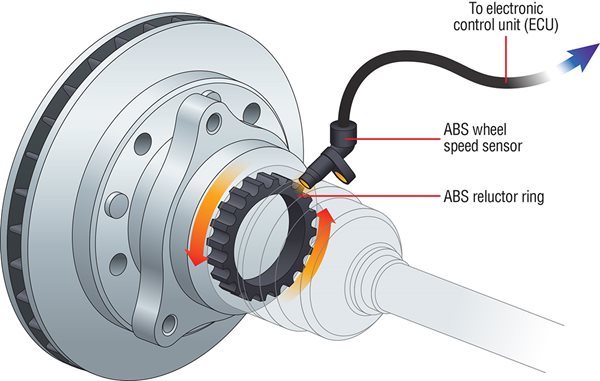ABS : Antilock Braking System
We are sometimes in a situation where we have to apply the emergency brakes. When we brake suddenly, or when we brake on a wet or slippery surface, the wheels of our vehicle may lock. Locking wheels causes tyre adhesion to the road surface to be reduced, making the vehicle unsteerable. The antilock braking system (ABS) prevents the wheels from locking and allows for safe braking.
In a Nutshell, ABS allows a car’s wheels to maintain tractive contact with the road surface while braking, preventing the wheels from locking up (slowing rotation) and preventing uncontrolled skidding.
ABS : The Underlying principle
ABS is based on the Cadence Braking principle or technique. It is, in fact, an automated system that employs cadence braking principles.
Cadence braking, also known as stutter braking, is a driving technique that involves pumping the brake pedal and allows a car to steer as well as a brake on a slippery surface. It is used to perform an emergency stop when traction is limited in order to reduce the effect of skidding caused by road wheels locking up while braking.
The ABS system accomplishes this at a much faster rate and with greater control than most drivers are capable of. If a wheel locks up, ABS reduces brake pressure and then increases it. This reduces braking distances, even on slippery surfaces, and keeps the vehicle steerable.Some anti-lock systems are capable of applying and releasing braking pressure 15 times per second.
ABS : Introduction of ABS Sensor

The ABS sensor, or wheel speed sensor, is a simple but critical component of the ABS system. A wheel speed sensor is a type of tachometer that measures the rotational speed of a wheel and passes it to the car’s Engine Control Module (ECM).
Because all four wheels do not turn at the same speed, the ABS sensors report the speeds of all four wheels to the ECM, which determines whether the wheels are locking up.
Failure of ABS Sensor

Generally speaking, ABS sensors are very reliable; however, because of their location, they have a relatively short lifespan. As a result, few car owners experience frequent ABS sensor issues in their vehicles.
Exposure to road debris and other impurities can cause the ABS sensor to fail over time. It is critical to clean and inspect the sensors at the intervals specified in the user manuals for optimal performance. One of the most obvious signs of a faulty ABS sensor is the illumination of the ABS or traction control light in your vehicle’s dashboard. A bad wheel speed sensor can also cause a significant loss of traction when driving in slick road conditions.
It should be noted that the ABS sensor does not always fail; the wiring or connectors can also fail, preventing the necessary signals from being transmitted to the ECM. So, before inspecting and replacing the ABS sensor, it is a good idea to inspect its related components to determine which part is at fault.

